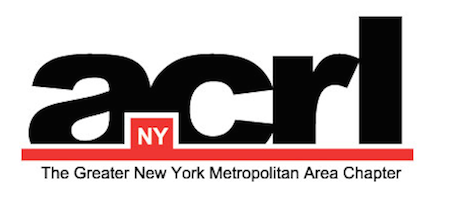 By Elaine Provenzano
By Elaine Provenzano
The afternoon of the ACRLNY 2015 Symposium commenced with the shared perspectives of two academic librarians. In her presentation, “The Practice of Core Values: Academic Library Diversity Plans and the ACRL Diversity Standards,” Ione T. Damasco, Cataloger Librarian at the University of Dayton, presented the findings of her research on ACRL diversity standards and compliance by academic libraries. Damasco argued that diversity planning can provide a blueprint for creating policies integral to the institution and can demonstrate the value of the library. Citing ALA and ARL diversity planning guidelines and reports, Damasco chose the ACRL Diversity Standards: Cultural Competency for Academic Libraries (ACRL 2012) as a rubric for her study. She looked specifically at how these standards are reflected in her large polling sample of academic libraries and the diversity plans within those institutions.
Damasco found that only 22 academic libraries—out of the 1561 where she made inquiries—had diversity plans, and many schools were unaware that ACRL diversity plan standards existed. The top three standards the 22 existing plans reflected within were: “organizational dynamics,” “workforce diversity,” and “professional educational and continuous learning.” The least-used standards were “language diversity,” “cultural awareness of self and others,” and “research.” In terms of the language the plans employ, the word “inclusion” appears most frequently, followed closely by “equity” and “social justice.” Terms that did not appear include “racism,” “oppression,” “racial justice,” “sexism,” “inequality,” “white privilege,” and “whiteness.”
The outcomes of Ione Damasco’s study could have a far reaching effect on the future of diversity planning within academic libraries. In mining and examining diversity plan standards, as well as fostering foundational guidelines within the profession, her work inspires each of us to examine areas of advocacy and diversity planning within our own institutions.
Damasco was followed by Isabel Espinal, Librarian for Afro-American Studies, Native American & Indigenous Studies, and Latino Studies at the University of Massachusetts Amherst. Espinal’s theme was “Parables, Poetics, Polemics and Politics: The Application and Misapplication of Core Librarianship Values in Education, Diversity, and Social Responsibility.” Espinal drew on her varied experience in both public and academic libraries, reflecting on the lack of diversity and social justice within the institutions where she has worked. Discussing differences in the way people are treated, she asked, “How many people of color actually become managers?” She used this question to reveal her own efforts to break and move beyond barriers or agendas set by others, exemplified by her work as a reference and subject librarian at Amherst and her participation in Reforma, Upward Bound, and the Dominican Book Project. Espinal offered powerful examples of “outside of the box” thinking on these important issues and ended her discussion with a question for academic libraries to consider more broadly: “In the moment where libraries have re-imagined themselves, where is the imagination in social justice?”
In a subsequent panel discussion moderated by Starr Hoffmann, both presenters shared advocacy efforts pertaining to ALA core values. On lifelong learning and social justice, Ione Damasco posed the question, “How do we connect to our community? As a campus of predominantly white, upper-middle-class students within a blue collar city, we can leverage our strength of Catholic social justice to create more community connections which foster lifelong learning.”
Isabel Espinal discussed building upon relationships she has created within her community using social media platforms, such as Facebook, and other initiatives. An NEH grant, for instance, provided resources to the Native American Studies program to hire professors to teach about misleading American history.
Answering a question posed by Hoffman on power and authority within the panelists’ daily work, Damasco felt that as a cataloger she has a unique perspective on classification and naming. Although her position has some constraints, as a member of faculty she has the “leveraging power to challenge some of the structures in place at work. Doing things that are atypical of a cataloguer.” Her work with cultural affairs has helped to make a small dent. As the “only person of color in the room,” you can encourage consideration of all perspectives in the college. Espinal advocated on behalf of staff. “If we are using our leverage for power, how do we help fight for somebody else? Why doesn’t everyone get sabbaticals? They should be able to share in the privilege.” Paraprofessionals feel there are issues of classism and feel marginalized, she said. Although it can be a complicated issue, it is an area that needs more exploration.
Throughout the panel discussion, Damasco and Espinal each proposed that diversity issues are integral to what we do and should not be viewed as separate, and that each of us has the power to “change the conversation.”
Elaine Provenzano serves on the ACRLNY Symposium Committee and on the Executive Board as Co-Editor of the ACRLNY Connections newsletter. As Assessment and Marketing Librarian at Manhattanville College, she coordinates data-driven library assessment efforts and fosters outreach and marketing initiatives between the library and a diverse community of students, faculty, staff, and alumni. Elaine has an MSLIS with a concentration in Rare Books and Special Collections from the Palmer School at Long Island University; an MA in Liberal Studies from Manhattanville College; and a BS from SUNY Empire State College.
